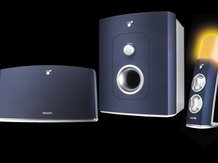amBX no longer tied to Philips
'Sensory experience' maker strikes out on its own

Philips Research has spun out its amBX arm to make it into a fully standalone company, along with some extra cash from venture capitalists.
Responsible for attempting to bring sound, wind, lights and motion into the gaming experience, the amBX brand has slowly been gaining recognition with games developers and consumers alike.
The plan is to use the systems, which include light towers, fans and rumble strips, not just in a PC gaming environment but in music, film and public venue entertainment as well.
Infuriating little jogs
"The fans are infuriating little things," says PC Zone's Steve Hogarty. "Hit the sprint key in Far Cry 2 and they start shyly wafting air into your face, creating the supposed illusion that you're swooshing gazelle-like through the African countryside (although, unbelieveably, you're still at your PC).
"It's hardly effective - having air weakly blown at you is irritating at the best of times, and amBX ultimately conditions you to avoid breaking into anything more than a leisurely jog. The ambient lighting system is a more subtle and immersive effect though, and is actually quite pleasant if you've got the right surroundings."
Philips stays in
Get the best Black Friday deals direct to your inbox, plus news, reviews, and more.
Sign up to be the first to know about unmissable Black Friday deals on top tech, plus get all your favorite TechRadar content.
Philips is to remain a licensee of the technology (no surprises there then...), but will also license the technology to other manufacturers as well, allowing the standard, which requires certain coding to build the lighting, wind and motion factors into the game or movie, to gain more acceptance.
"We're now ready to take amBX to the next level and our successful spin-out as an independent company will allow us to drive amBX as an essential platform for not only PC, but for console gaming entertainment, home theatre, music and even larger, bespoke installations in large scale entertainment venues," said Neil MacDonald, CEO, amBX.
Philips Research has been responsible for a number of spinouts from its incubation centre. Polymer Vision, developers of the flexible e-book reader the Readius, and Liquivista, which is working on full colour flexible video displays are two good examples, with more likely to come in the future.

Gareth has been part of the consumer technology world in a career spanning three decades. He started life as a staff writer on the fledgling TechRadar, and has grown with the site (primarily as phones, tablets and wearables editor) until becoming Global Editor in Chief in 2018. Gareth has written over 4,000 articles for TechRadar, has contributed expert insight to a number of other publications, chaired panels on zeitgeist technologies, presented at the Gadget Show Live as well as representing the brand on TV and radio for multiple channels including Sky, BBC, ITV and Al-Jazeera. Passionate about fitness, he can bore anyone rigid about stress management, sleep tracking, heart rate variance as well as bemoaning something about the latest iPhone, Galaxy or OLED TV.